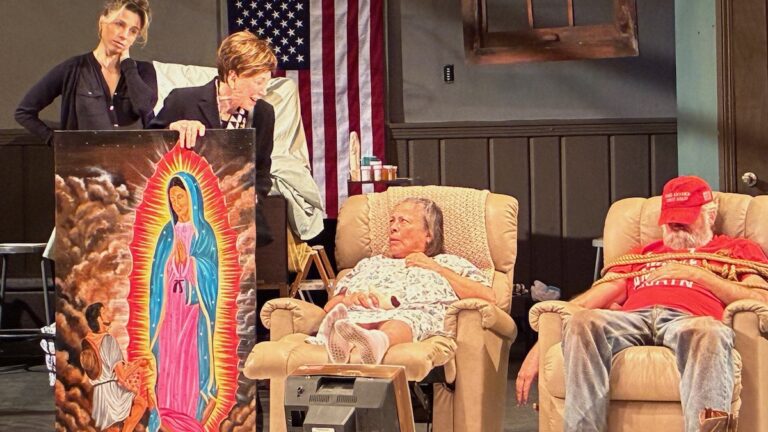A Story Inspired by The Matriarchs of Her Family and La Virgen de Guadalupe
By Bel Hernandez
It was taco Tuesday at the Homegirl Cafe, when two Chicanas from Boyle Heights/East L.A. sat down to talk about The Mother of Henry, playwright Evelina Fernandez’s latest play, which opens Saturday, March 23rd at the Los Angeles Theater Center in downtown L.A.

Fernandez is at it again. They say to “write what you know” and she knows a lot about growing up in East Los Angeles. A native of Arizona, she came to Los Angeles as a nine year old. Being raised by a single mother in the predominately Latino neighborhood of East L.A. in the 60’s has shaped Fernandez’s perspective of the world. Actress turned writer, Fernandez shares her perspective in the stories she chooses to tell, whether it’s on stage, on film or TV.
Although she first gained prominence as an actress, she was one of the original cast members of the acclaimed Luis Valdez play Zoot Suit, then went on to star in two films produced by Latinos, about the Latino community.
After landing roles on television and a couple of major studio films, one of which was the female lead in American Me which was directed by her former Zoot Suit cast mate, Edward James Olmos, she became frustrated with the lack of work and the quality of roles, and decided it was time to make some changes.

Her first foray into writing was in 1996 when she wrote the play How Else Am I Supposed to Know I’m Still Alive. In 2000 she wrote, produced and played the lead in the film Luminarias, which was a commentary about race, sex and love from the perspective of single Chicana and her three friends. Groundbreaking for its time, Luminarias was written, funded, acted and directed by the Latino community — and this was almost 20 years ago.
Instinctively, Fernandez always knew she was a writer. As a sickly child, she remembers her mother reading to her while in the hospital, filling her mind with the magic of storytelling. And although she started acting in high school, she was a writer first, recalling that she was already writing short stories while attending Rowan Elementary in East L.A.
Embracing the power of the written word, Evelina has now realized her true calling. “I used to describe myself as an actress who writes. Now I say I am a writer who acts,” she declares.
A founding member of the Latino Theater Company (LTC), for the past 20 years she has written plays with the members of LTC in mind, tailoring the characters around their strengths. Two of those plays, Solitude and Dementia have made the Los Angeles Times Critic’s Choice list.
Fernandez’s The Mother of Henry takes place 1968, a year of watershed moments in the United States. Connie, a single mother gets a job at Sears in Boyle Heights, an economic hub in Los Angeles where people of all cultures and nationalities shop and work. When Connie’s son gets drafted and is sent to Vietnam, her mother learns to pray to La Virgen de Guadalupe for his protection.
On the eve of the premiere of The Mother of Henry, Fernandez talks about the inspiration for her characters, the casting, and ther return as a writer to the Los Angeles Theater Center stage after a small hiatus.
Latin Heat: After working as an actress why did you decide to become a writer?
Evelina Fernandez: I started writing for the people in our company [The Latino Theater Company]. I guess my first play was for Lupe [Ontiveros] and Angela [Moya], How Else Am I Supposed Know I Am Still Alive. I wanted to write a play because they were such great actresses and they never got a chance to play anything of substance.
LH: Tell us about The Mother of Henry? Where does the inspiration for this play come from.
EF: The Mother of Henry is about a time I lived through. It was inspired by my mother who used to work at Sears on Olympic and Soto in East L.A. My brother enlisted in the Navy and he ended up going to Vietnam. It was a very stressful time for all of us. My mom was a single mom in her late 30’s early 40’s at the time, as is the character of Connie in the play.
The story is also inspired by the times we lived in. 1968 was such a shattering year for our country. We lost Martin Luther King, and then Bobby Kennedy was assassinated. It’s when the Black Athletics raised their fist in the Black Power protest at the Olympics in Mexico, which was such a big deal. There was also the massacre in Tlatelolco in Mexico, and the “burn your draft card” demonstrations. Then at the end of that year the country elects Richard Nixon. All that happened in 1968.
LH: You take us back to a very important time in our country’s history. As you did with your Mexican Trilogy plays.
EF: This play kind of fills in the blanks. The Mexican Trilogy kind of skips over the 60’s. It starts in the early 60’s and ends when President John F. Kennedy is assassinated [in 1963].
The late 60’s was a time when the world was changing. My mom’s generation was really patriotic, they lived through World War II, they were all pro America. And then our generation, we were totally against the war, because people we knew were dying.
LH: A time of extreme division. And then there was your grandmother’s generation. She also an inspiration for this play. In what ways?
EF: We weren’t raised very religious. We never went to mass or anything like that. Not until we moved in with my grandparents. My grandmother was a “Guadalupana” she used to pray to the “Virgen de Guadalupe” all the time. So my grandmother was always telling my mother ‘Tienes que rezar,’ ‘You need to pray the rosary. You need to confess your sins. You need to go to mass’.
So in the play when Connie’s son goes into the service, his mother, the character inspired by my grandmother, is nagging her that she is not a good Catholic, so Connie begins to pray to the Virgen de Guadalupe, and the Virgen appears to her, they become friends, and they develop a friendship. There is a bit of magical realism in there.
LH: That’s just what I was thinking!
EF: It’s part of our culture and our reality. That we believe — we believe in signs when something happens.
LH: Tell us about the cast of The Mother of Henry.

EF: A lot of our cast have been part of our artistic family for quite a while. Xavi Moreno, my daughter Esperanza America, Ella Saldaña North…they were all in The Trilogy. Cheryl Umaña Bonilla was Jose Luis’s student at UCLA. We have experience with them. They’re young actors who are very talented.
Also, this is a very diverse cast of characters, from different backgrounds. Because when my mom worked at Sears, her best friend was Italian and her other best friend was Canadian and there is also a Jewish character. A departure from what I usually write.
LH: So this play takes place in East L.A.
EF: Yes. The play takes place mostly at Sears, at Connie’s house, and at a “burn your draft card” demonstration that Connie goes attends.
LH: A lot of your plays center around women. Do you think that growing up without a dad influenced your writing?
EF: Absolutely. Jose Luis [her husband and artistic director of the LATC] says ‘Every time you write a Latino character, he’s bad’. And I guess it’s true, there is a bad Latino character in this one too. [Laughing]. He’s a womanizer, like my father was. My father didn’t drink, he didn’t have any “vicos” [vices] but man he was a womanizer. He cheated on my mom all the time. But you know, when they got married she was 15 and he was 18. What do you know when you’re that age.
LH: If you could, what would you say a young Evelina growing up in East L.A.?
EF: I would say ‘Have more confidence; look at the beauty in your community; and, create your own work. Don’t sit around waiting for someone else to offer you a job’.
Fernandez is a testament to what she believes. Her plays are unapologetic portraits of Latinos in her community and they create work for her and her fellow Latinos. Her plays have garnered critical acclaim and awards. They encompass many issues plaguing society as a whole, but with a bird’s eye view of Latinos; stories about life, from military, to civil rights, family, AIDS, and matriarchy, and so much more.
So what’s left to write about? The focus of Fernandez’s next play has already been decided. As the baby boomer generation finds itself taking on the caregiving for their parents, it is a hot top of debate, and one that resonates with all audiences and with Latinos who tend to want to be there for their parents in their golden years. Told thru the Fernandez Latina lens, it will be another slice of Mexican culture we can look forward to enjoy.




